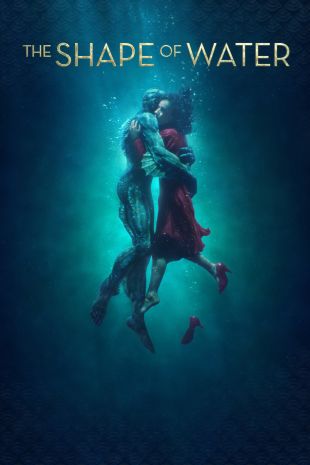
Fans of Guillermo del Toro know what to expect from his style: fantastical visuals, sumptuous worldbuilding, and whimsy contrasted with menace. The Mexican writer/director delivers all that and more in his newest feature, The Shape of Water, a fable ultimately about the desire to be heard, understood, and loved.
The Shape of Water establishes that it's taking place in a surreally magical version of our world (circa 1962) from the opening scene of its heroine, Elisa Esposito, floating in an aquatic dream. Elisa (Sally Hawkins) is a mute orphan with an Amélie-like appreciation for simple pleasures. She works as a cleaning lady at a government facility, alongside her chatty but loyal friend Zelda (Octavia Spencer), and lives above a movie theater next door to Giles (Richard Jenkins), an out-of-work, gay illustrator.

Giles feels invisible in his work and romantic life, while Zelda feels unappreciated by her husband, and they both find someone to affirm their worth in Elisa. Her silence also fascinates odious government agent Richard Strickland (Michael Shannon) after he arrives at the facility with a captive amphibian being (Doug Jones). Elisa quickly forms a bond with the creature over their shared inability to communicate with words, and, for the first time, she feels understood.
Once again, Jones, del Toro's frequent collaborator and a master of prosthetic performances, does a seamless job disappearing into the role of an otherworldly creature. And both Spencer and Jenkins are delightful and exhibit fantastic comedic and dramatic timing, which is necessary to create compelling scenes when the film's two leads don't speak. But the true star of the whole production is Hawkins, who is already deservedly garnering Oscar buzz for her work. It feels as if this role were made for her, and in fact it was: del Toro wrote the part with her in mind. It's a good thing she agreed to the movie, because it's hard to imagine anyone else finding a way to balance diminutive innocence and self-doubt with strength, sensuality, and self-assurance. For all her twee proclivities, like using a shoe brush shaped like a duck, Hawkins makes Elisa's inner life vibrant and relatable. The cheery, eerie musical score from French composer Alexandre Desplat helps to effectively magnify her gestures and reactions to convey her internal emotional state.
del Toro isn't one to shy away from symbolism, and this story is chock-full of it. Water, whether falling in raindrops, boiling in pots, or sloshing in tubs, is a recurring symbol of desire and connection (as is the color teal). This is communicated subtly but conspicuously enough so the average viewer can pick up on the patterns and extract their meaning, much like the fairy tales del Toro emulates.
While the movie relies on somewhat archetypal characters and a predictable plot, its core message about overcoming fear and loneliness by seeing the humanity in one another will resonate with anyone who's ever felt unheard. And for fans of del Toro, this transportive, visually decadent film will demand future viewings so they can bask in the beauty of the world he has created.
